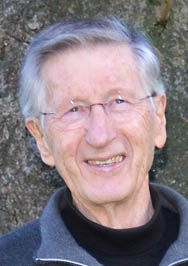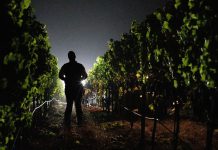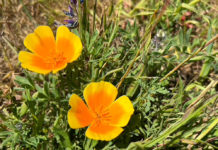Hurricanes, floods, and earthquakes — our human doings can seem piddling by comparison. So, once again, preachers and other more or less religious types proclaim signs of the end and portents of divine disfavor.
For scientists, a natural disaster is just a natural disaster. Atmospheric disturbances, fault lines deep in the earth, water seeking its own level and all sorts of facts and figures explain not only what happened, but why.
The science versus religion debate has been with us for well over 500 years, ever since Copernicus and Galileo established through observation and mathematics that the earth is not the center of the universe. Religious authorities considered this heresy and reacted with sometimes gruesome intimidations. Galileo was fortunate to suffer nothing worse than house arrest for his religiously offensive but scientifically correct findings.
It seems to me that we religionists must face up to Albert Einstein’s saying, “The laws of physics are the decrees of fate,” which, if you want to be theological about it, becomes “The laws of physics are the will of God.”
This sounds fine until you factor in storms like those that hit Texas and Florida or earthquakes like the one in south Mexico. Then you’ve got yourself a very complicated God. As poet Archibald MacLeish put it some years ago, “If God is good he is not God, / If God is God he is not good.” In 60-some years of looking into that dilemma, I have seen no satisfactory solution to it. Religions that don’t adhere to a supreme deity, like some forms of Buddhism, have an easier time of it on this point, one would think.
Even so, I believe the discussion between science and religion must go on.
For sure, scientific understandings have brought us all sorts of advantages and comforts, and their pinpoint predictions about where heavenly bodies will be at any given moment is truly amazing. It can seem like this is the only kind of knowledge we need.
And yet I still remember the Scot theologian John Baillie speaking in 1956 at the 200th anniversary of Nassau Hall, the original building at Princeton University, and for a time during the Revolution, the capital of the United States. Baillie quoted an astronomer friend of his who said, “I can tell you exactly where the planet Venus will be at noon on December 8, 2078, but I can’t tell you where my teenage daughter was last Friday night.”
Yes, there are still mysteries, and there is a moral side to the discussion that is often left out. It may be that science will save the world before science-born technology destroys it, but so far the jury is out on that score. Scientists don’t much like the question. Even if we can do it, should it be done? I heard Robert Oppenheimer lecture on this subject late in his life. As a scientist, he said, his goal was to see if an atomic bomb was possible, but to the end of his days he agonized over the bombs dropped on Japan in 1945.
Clearly, we need many kinds of knowledge. We need ethical discourse as well as scientific clarity. We need a renaissance in our sense of right and wrong as well as ever expanding technology. We need to sustain the struggle toward what is fair and just. And we need to cultivate a sense of what is significant, even holy, about life on this planet. For all this, we need vigorous inquiry into history, law, politics, philosophy, and deep participation in religion and the arts.
On a day in 1954, Princeton Seminary was in the path of an eclipse of the sun. As the sky began to darken, faculty and students put on special glasses and gazed skyward among the huge elm trees, old ivy covered buildings and gleaming white chapel. John Mackay, president of the seminary, noticed that his neighbor Albert Einstein was there. Mackay said, “Ah, Professor, welcome to the seminary. How kind of you to join us today.” And Einstein replied, “At times like these I like to be on holy ground.”
Yes, we can have both science and holiness. May it be so.
Bob Jones is the former minister of the Guerneville and Monte Rio Community Church.









